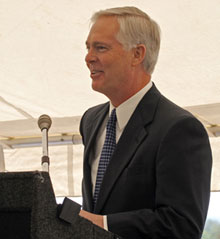NORTH CAROLINA SPOTLIGHT
Easley Touts Work Force as N.C.'s Best Industry Lure
Gov. Easley says areas suffering from the offshore shift of furniture manufacturing such as Lenoir are now getting attention by state economic developers.
 |
| North Carolina Gov. Mike Easley speaks during a Sept. 21 groundbreaking ceremony for the new State Data Center in Rutherford County. The $25- million, 53,000- sq.- ft. (4,900- sq.- m.) facility will give the state the capability to back up critical applications. The fiber infrastructure required by the data center may open up the county for consideration by high-tech companies. |
"We have a lot of stuff in the pipeline all over the state," Easley says. "It's a diverse mix, a little bit of everything."
Easley says as the state shifts from its traditional textile and furniture industries to high-tech sectors, it has invested heavily in retraining of workers through community colleges and placed emphasis in high schools on areas of manufacturing growth such as biotechnology.
Ask Easley to cite the next North Carolina industries to see rapid growth and he cites the alliterative pair of nano and NASCAR.
"Last year, the motorsports industry had an economic impact of $5.9 billion on the state with more than $2 billion generated by NASCAR," Easley says. "And NASCAR is one of the fastest growing and highest-paying industries in the state. North Carolina is also one of the national leaders in nanotechnology.
"Getting the NASCAR Hall of Fame was a natural for North Carolina and it helps us slam the door on other states who've been reaching out to try to recruit this industry away from us," he says.
North Carolina's generous incentive programs have helped lure many projects during Easley's tenure. The state's General Assembly this year extended one program and tweaked another.
"We have shifted our incentive focus from entitlement-based tax credits to a more nimble, negotiable JDIG and One North Carolina Program," Easley says. "This allows us to tailor programs more effectively to meet individual company needs. This year, we have funds for small businesses that get SBIR grants to help encourage startups – a tool we did not have before."
Easley says the question he is asked most frequently by companies looking at North Carolina is about work force availability.
"Work force quality is at the top of the list, and they want to know if the work force is going to be there not only today, but 10 years from now. So I discuss my pre-K-through-12 initiatives with them and what is going on at our community colleges to give them some confidence that we want them to succeed not only now, but for years to come in North Carolina. Every time we negotiate one of these deals, the talk turns to the work force and education opportunities. We make the point that in North Carolina nobody's more than 25 minutes from a community college."
"Starting in 2001, we put a tremendous amount of money into our community colleges and expanded our offerings," Easley says. "It was pretty clear that low-skilled jobs were going overseas and we accepted that. Roughly a third of the U.S. textile industry works in North Carolina and we've been losing those jobs pretty fast."
One industrial prize the state has yet to snare is an automobile assembly plant. That's something Easley hopes to land before he leaves office in early 2009. He says some view this as the state's hole in the doughnut.
"We had continual growth in our automobile components sectors, though we do not have an auto assembly plant in North Carolina – at least not yet," he says. "We haven't given up on that, but we are building a significant parts manufacturing base here. If you add up all the jobs, you would have equal to or more than what you would get with a good automobile assembly plant. And if one closes down, you don't lose 4,000 jobs in one shot. Auto parts plants don't [require] a lot of incentives and they're spread across the state.
"We would like to have an assembly plant and we are aggressively pursuing it, but probably not as aggressively as other states might," he explains. "We don't want to do anything to impede our parts manufacturing."
Biotechnology is one of the state's fastest growing sectors and the state is consistently in the top 10 in national rankings. Easley says North Carolina's biotechnology training network, with its nucleus at N.C. State University and programs at community colleges, provides a pipeline of workers for biotech and pharmaceutical manufacturing.
"Our biggest advantage over who we compete with – San Diego, San Francisco, Massachusetts and the Maryland-Virginia area – is that we can do everything they can do, if not more, but we can do it 20 to 25 percent cheaper when you look at labor and capital investment," Easley says. "That's the sell that seems to be working. Biopharma is pleased with our work force."

